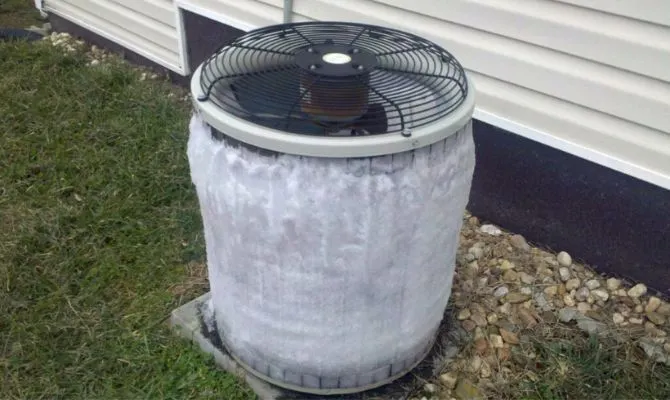Air conditioning coils can freeze at any time of the year, and this can cause major problems for your home’s heating and cooling system. To ensure that your AC is always in good working order, it’s important to regularly check the system and perform preventative maintenance. Whether it’s winter or spring, it’s always a good time to check on your air conditioning.
By identifying issues early on, and by incorporating preventative maintenance into your routine, you can ensure that your AC coils are functioning properly. This will keep your indoor spaces cool and comfortable, avoiding any unpleasant surprises and costly repairs. Regular maintenance can also increase the lifespan of your AC unit, saving you money in the long run.
AC Coils Frozen? What Are the Symptoms?
Possible Causes of Frozen AC Coils
There are several possible causes of frozen AC coils, some of the most common are:
- Low refrigerant levels, which can cause the evaporator coil to freeze.
- Dirty air filter, which can restrict the airflow and cause the coil to freeze.
- Malfunctioning thermostat, which can cause the AC to run longer than necessary, causing the coil to freeze.
- Blocked condensate drain, which can cause water to back up and freeze on the coil.
What Causes AC Coils To Freeze?
Frozen AC coils can happen for a variety of reasons with your HVAC system. Here are some of the most common causes and what you can do to avoid them:
- Dirty air filters can block the airflow and cause the coils to freeze. Remember to regularly check and change your air filters to make sure the airflow is good.
- Broken fans are important for circulating air throughout the system. If the fan isn’t working well, it can stop the airflow and make the coils freeze. It’s a good idea to have a professional check and fix or replace the fan motor or blades if needed.
- Blocked condensate lines are used to drain away extra moisture from humidity. If these lines get clogged, it can cause water to freeze near the evaporator coil. Regular cleaning and maintenance of the condensate lines can prevent this problem.
- A malfunctioning thermostat can cause the AC to run too long, making the system overworked and the coils frozen. Make sure to have a professional check your thermostat to ensure it’s working properly.
- Refrigerant leaks can happen and it is important to have a professional fix any leaks or replace the coil to prevent further issues, as refrigerant is the chemical that runs through the AC coils, changing pressure and temperature to absorb heat.
Troubleshoot Frozen AC Coils
If you’ve determined that your air conditioning coil is frozen, the first step is to turn off the unit to prevent compressor failure. This is important because if the compressor continues to run while the coils are frozen, it can cause damage to the system and result in costly repairs. It’s best to call a professional to diagnose the cause and fix the issue. They will be able to identify which of the five common causes of a frozen AC coil is responsible for your problem, and take the necessary steps to repair it.
While you’re waiting for help, there are a few things you can do yourself to minimize damage. One of them is to find and clean up any water damage caused by melting ice. This is important to prevent further damage to your building. Additionally, you can try to melt the ice yourself by turning off the system and waiting for it to melt, or using a hair dryer to melt it. However, it’s important to avoid cutting or chipping the ice off, as this can damage the coils. Once the ice is melted, you can turn the unit back on and wait for the professional to arrive to fix the underlying problem.
Prevent AC Coils From Freezing
If the thought of dealing with frozen AC coils is overwhelming, a preventative maintenance plan may be the solution for you. This type of plan includes regular inspections and maintenance performed by an HVAC specialist, which can help prevent problems from occurring in the first place. These inspections are typically done before the start of summer and after the end of fall, and include tasks such as changing filters, cleaning coils, and checking for leaks in the lines.
Frozen AC coils often occur as a result of a smaller issue that has been left unaddressed for too long. A preventative maintenance plan ensures that any problems are identified and addressed early on, before they lead to a breakdown or costly repairs. Not only is a preventative maintenance plan more cost-effective in the long run, but it also ensures that your business is not impacted by unexpected AC failures, allowing you to focus on more important matters.



